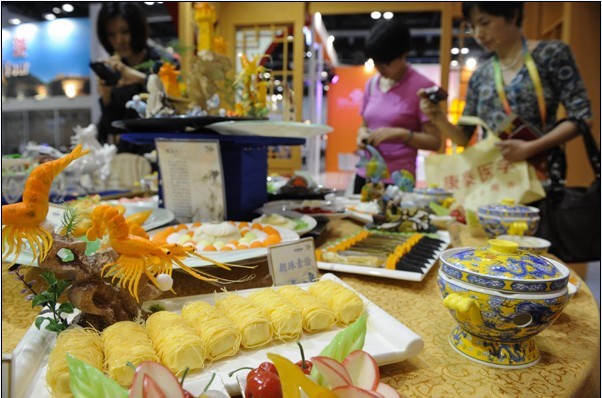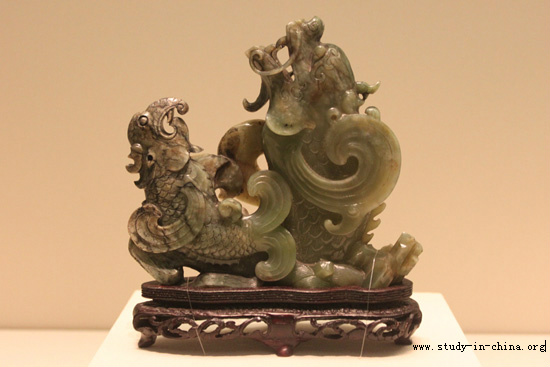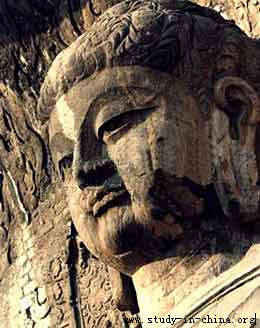| Home > China Feature |
Cai Wenji - A Brilliant but Stifled Talent
Women of Cai Wenji's talent and education were rare in the later part of the Eastern Han Dynasty (A.D. 25-220), when fierce struggles raged within the ruling circles with high court officials on the one side and the Queen's relatives and the court eunuchs on the other. It was a time of abject poverty among the peasants — deprived of their land by rich and powerful officials and big landlords. The severe social conflicts led to many peasant insurrections such as that perpetrated by a group known as the Yellow Turbans, which shook the rule of the Eastern Han. Local officials of Cai's day were concerned with suppressing such revolts, and expanding their military forces to fight in local wars against each other. Finally the dynasty divided into three distinct states — the Wei, Shu and Wu, known in history as the Period of the Three Kingdoms.

In the midst of all this, Cai Wenji, a native of Chenliu (present-day Kaifeng) in Henan Province, became a well-read woman of letters, an eloquent speaker and a highly refined calligrapher and musician. But her life was marked by misfortune.
As a youth, her father, Cai Yong, had been known to be a dutiful son and kind brother. He was talented and proficient in literature, poetry, thematics, astronomy, music and calligraphy and grew up to be a noted scholar. An editor at the imperial library, he was struck by the strain one had to endure when reading the various interpretations given to classics over the centuries, and made a proposal to Emperor Ling (172-178) asking permission to edit the Six Classics, namely, The Book of Songs, The Book of History, The Book of Changes, The Book of Rites, The Book of Music and the Spring and Autumn Annals. When the work was done, Cai Yong wrote down the final versions on stone tablets and had them carved and erected in front of the imperial college outside the southern gate of Luoyang. These tablets served as reliable texts for all, and people travelled distances to read, compare and copy them. They were called the "stone classics of Xiping" by later generations, and parts have survived to present day.
Influenced by her father, Cai Wenji started studying at an early age. It is said that on one occasion while her father was playing a 7—string zither for relaxation, one of the strings snapped. Wenji told her father without looking, that it was the second string that had broken. Assuming that his little daughter had only coincidentally guessed correctly, Cai Yong kept on playing. When he purposely broke another string, he was surprised that the girl immediately announced that he'd broken the fourth string that time. From this he concluded that Wenji had an ear for music.
In 178, Cai Yong was framed and thrown into prison. Later he and his 2 year-old daughter were banished to Shuofang in north China (today's Inner Mongolia). They lived there for nine months after which he was pardoned. In an effort to avoid further nvolvement with the powerful officials, Cai Yong spent the next 12 years with his daughter in southeastern China, living in various places between Wu and Kuaiji (near present-day Suzhou).
In 189, the situation changed briefly for the better after the death of Emperor Ling when state power fell into the hands of Dong Zhuo, the prime minister of the young successor to the throne. Dong Zhuo appointed Cai Yong to the top civil post in the court. Still Cai Yong was cowed into submission by Dong's power, and not more than three years later he was again put into prison after Dong Zhuo was overthrown and killed by Wang Yun. Cai Yong died in prison; but Wenji knew nothing of this.
She was married then and lived away from the capital. When her husband died two years ater, Wenji returned alone to her native city Chenliu, where, caught in the midst of a war, she was captured by the Xiongnus. Along with other women refugees, she was sent to the Xiongnu territory in the north and married to Zuoxian, a tribal chieftain, whom she bore two sons.
Twelve years later Cao Cao came to power as the prime minister in the Han court. Aware of the tragic death of his friend Cai Yong and the plight of his daughter, he sent an envoy bearing presents and money to the Xiongnus, asking that Cai Wenji be returned.
In the cold, desolate far north, the Xiongnus had different habits and customs and spoke a different language. Life had been extremely hard for Cai Wenji, a refined intellectual woman from central China. Always hoping to be able to return to her own homeland, Cai Wenji later wrote down her feelings of homesickness in a poem Agony:
My dwelling is often covered by frost and snow;
There are strong northerly winds in spring and summer.
The winds lift the edges of my clothes,
And I hear them howling around me.
I long to see my parents and am filled with grief,
Always delighted was I to have guests from my homeland.
I lost no time in throwing eager questions at them,
Only to find that they were not from my hometown.
She was therefore overjoyed when she learned that she had been summoned back by Cao Cao, who, she knew, was her father's close friend.
The only things which stood in her way were her children. According to local law and custom, she could not take them with her --- she had to leave them behind. Reluctant and torn, she bid them farewell and made the long journey alone back to her native place.
During the years of her absence, the face of her country had changed. The years of war had left their mark. Many of her kinsmen were either dead or had moved. In this war-ravaged land, the once busy town had been turned into a place where one could hear "no human sounds, only the howling of the wolves", as Cal put it in one of her poems. She saw "white bones of the dead lying in the road". Nearly overcome with loneliness and sadness, she turned to the benevolent Cao Cao for help.
At his suggestion, she was married to Dong Si, a supervisor of an army farm. Just as she was beginning to live a new life, her husband was sentenced to death by local authorities for having violated the laws. Frantic, Wenji went to the capital to plead intervention from Cao Cao, who was then entertaining guests at a banquet. Though dressed in poor clothes she was ushered in and introduced to the guests as the daughter of the great scholar. Cai Wenji eloquently pleaded her husband's case, winning the sympathy of everybody present. Convinced and touched by her argument, Cao Cao revoked the death sentence and in addition, ordered that warm clothing and shoes be issued to her husband.
At a later time Cao Cao asked Wenji about the whereabouts of her father's literary works. According to her, some 4,000 volumes had been left behind, most of which had been destroyed during the war. As she still remembered a few hundred articles, Cao Cao wanted to send someone to her to copy them down, but Wenji offered to do the work herself. So 400 of her father's articles survived, written in fine regular or cursive script.
After settling down she recalled the bitter past, her wandering from place to place, the looting and killing that took place in the wars, her life with the Xiongnu, the longing for central China and the sad parting with her children all of which she describes in her long poem Agony. This brilliant work, passionate, bitter and defiant, captures the hearts of readers for its forcefulness and authentic feeling. The 18 stanza ballad she set to music herself, known as The Eighteen Laments, rings with angry accusations and bitter resentment. She wrote many other works which were later compiled into a Collection of Cai Wenji's Poetry and Prose. Unfortunately most of the contents have been lost. Her only works extant are the Agony and The Eighteen Laments.
A rubbing of the first two lines of the first stanza of The Eighteen Laments can be found in the official calligraphy copy book of the early Song Dynasty. It reads like this: "I was born in a time of peace, after which the Han Dynasty began to decline." Written in Wenji's flowing style, these words can now be seen on the original stone tables in the Forest of Steles in the Shaanxi Provincial Museum.
Art
 more
moreChina Beijing International Diet ...
Recently, The hit CCTV documentary, A Bite of China, shown at 10:40 ...

Exhibition of Ancient Chinese Jad...
At least 8,000 years ago, Chinese ancestors discovered a beautiful...

Longmen Grottoes
The Longmen Grottoes, located near Luoyang, Henan Province, are a tr...

Custom
 more
moreWeb Dictionary
Martial Arts
Chinese Kungfu---Tongbei Quan
Tongbei Quan or back-through Chuan, also called Tongbi Quan or arm...
African students came to China to study kongfu
A young African boy came to China to look for the flying heroes h...
The Code of Xia
The code of xia (俠) can be likened to the Anglo-Saxon myth of Robin ...





 print
print  email
email  Favorite
Favorite  Transtlate
Transtlate 







